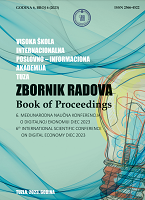ANALYSIS OF TOTAL FACTOR ENERGY EFFICIENCY OF WESTERN BALKAN COUNTRIES
ANALYSIS OF TOTAL FACTOR ENERGY EFFICIENCY OF WESTERN BALKAN COUNTRIES
Author(s): Edin Zahirović, Merima Orlić, Almira Arnaut-BeriloSubject(s): National Economy, Supranational / Global Economy, Energy and Environmental Studies, Socio-Economic Research
Published by: Internacionalna poslovno – informaciona akademija
Keywords: Total Factor Energy Efficiency; Western Balkans; SBM-DEA; Window Analysis;
Summary/Abstract: The aim of this research is to examine energy efficiency at the macroeconomic level of the Western Balkan (WB) and the EU countries from 2005 to 2019. Data envelopment analysis (DEA) with a slack-based model (SBM) was used, considering labour, capital and energy as inputs, and GDP and CO2 as desirable and undesirable outputs, respectively. A window analysis was used to capture the changes in energy efficiency over time. The estimation of total factor energy efficiency (TFEE) reveals that the group comprising the top 5 most efficient countries consists of Malta, Montenegro, Italy, France and United Kingdom. In the WB countries, Montenegro consistently maintained high efficiency, while Serbia showed an upward trend with a slight decline between 2013 and 2016. North Macedonia demonstrated a growth trend until 2010, followed by a decline with occasional minor recoveries. In Bosnia and Herzegovina, there is a continuous decline in TFEE with values ranging from 0,66 to 0,4. Albania shows mixed efficiency levels in different years (e.g., 2009, 2012, 2019 efficient; 2005, 2014, 2017 inefficient). In order to achieve efficiency, it is necessary for the WB countries to engage 131,29 PJ less energy for the same amount of output. The TFEE is compared to the values of traditional energy efficiency, and inconsistencies can be observed. Therefore, the WB countries are encouraged to implement a set of institutional, economic, and regulatory measures, along with investing in education and training, partnering and collaborating with the private sector and establish more ambitious energy savings goals within their strategic processes.
Journal: Zbornik radova Međunarodne naučne konferencije o digitalnoj ekonomiji DIEC
- Issue Year: 6/2023
- Issue No: 6
- Page Range: 105-125
- Page Count: 21
- Language: English

